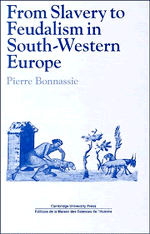Book contents
- Frontmatter
- Contents
- List of maps
- Foreword by T. N. Bisson
- Abbreviations
- 1 The survival and extinction of the slave system in the early medieval West (fourth to eleventh centuries)
- 2 Society and mentalities in Visigothic Spain
- 3 From the Rhône to Galicia: origins and modalities of the feudal order
- 4 Descriptions of fortresses in the Book of Miracles of Sainte-Foy of Conques
- 5 The formation of Catalan feudalism and its early expansion (to c. 1150)
- 6 Feudal conventions in eleventh-century Catalonia
- 7 The noble and the ignoble: a new nobility and a new servitude in Catalonia at the end of the eleventh century
- 8 Rural communities in Catalonia and Valencia (from the ninth to the mid-fourteenth centuries) (in collaboration with Pierre Guichard)
- 9 From one servitude to another: the peasantry of the Frankish kingdom at the time of Hugh Capet and Robert the Pious (987–1031)
- 10 Marc Bloch, historian of servitude: reflections on the concept of ‘servile class’
- Index
- Past and Present Publications
1 - The survival and extinction of the slave system in the early medieval West (fourth to eleventh centuries)
Published online by Cambridge University Press: 04 August 2010
- Frontmatter
- Contents
- List of maps
- Foreword by T. N. Bisson
- Abbreviations
- 1 The survival and extinction of the slave system in the early medieval West (fourth to eleventh centuries)
- 2 Society and mentalities in Visigothic Spain
- 3 From the Rhône to Galicia: origins and modalities of the feudal order
- 4 Descriptions of fortresses in the Book of Miracles of Sainte-Foy of Conques
- 5 The formation of Catalan feudalism and its early expansion (to c. 1150)
- 6 Feudal conventions in eleventh-century Catalonia
- 7 The noble and the ignoble: a new nobility and a new servitude in Catalonia at the end of the eleventh century
- 8 Rural communities in Catalonia and Valencia (from the ninth to the mid-fourteenth centuries) (in collaboration with Pierre Guichard)
- 9 From one servitude to another: the peasantry of the Frankish kingdom at the time of Hugh Capet and Robert the Pious (987–1031)
- 10 Marc Bloch, historian of servitude: reflections on the concept of ‘servile class’
- Index
- Past and Present Publications
Summary
During the night of 16 June 1944, somewhere near Lyons, Marc Bloch died, shot by the Nazis. Among the many unpublished texts which he left was a study entitled ‘How and Why Ancient Slavery Came to an End’. This article, later published in his journal, Annales, was the outcome of many years of research into one of the problems which, throughout his life, most preoccupied him; in fact, for Marc Bloch, the disappearance of slavery constituted ‘one of the most profound [transformations …] mankind has known’. His article not only provided much information and formulated new hypotheses, but opened up many lines of research. To what extent, in the forty years since his death, have these been explored and are we today in a position to answer the two questions he posed – why and how? Are we even able to determine when – this third question follows on from, but also determines, the other two – ancient slavery ended? My aim here is to review what we know (and do not know), and also to propose some new orientations and venture some answers; and this from a triple perspective – that of the factors in, and the forms and chronology of, the extinction of slavery in the rural societies of the early Middle Ages.
Forty years of research
Let us begin by looking at what Marc Bloch said. He asserted, firstly, something which was quite new at the time and is still far from being discredited, that ‘at the time of the barbarian invasions and in the early days of their kingdoms, there were still many slaves in all parts of Europe … more, it would appear, than during the early days of the Empire’.
- Type
- Chapter
- Information
- From Slavery to Feudalism in South-Western Europe , pp. 1 - 59Publisher: Cambridge University PressPrint publication year: 1991
- 4
- Cited by



